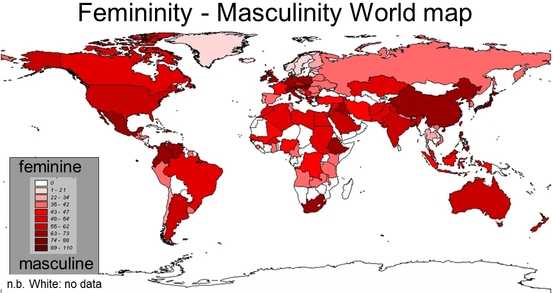Within Hofstede’s 6 dimensions model, masculinity stuck out to me. Because Russia is very strict, it makes sense to me that the society is patriarchal. Rarely have I seen Putin act any way other than calm, collected, and stern. There is an air of competitiveness within Russia and that contributes to its high power distance. The patriarchy is very prominent from an early developmental stage in society; this translates into organizational settings as well (Hofstede Insights, 2020). Compared to a feminine society where you care about what you do, masculinity is more about being the best and creating status with in the hierarchal society.

When looking at the map, it would appear that Russia is more feminine on the scale, and I was curious as to why this is. Russia clearly has a high power distance. According to Hofstede Insights (2020), the masculinity score is 36, which is low. Why? Because achievements are often not bragged about. Russians are withheld as subordinates especially, but in positions of power, they are outwardly dominant. When I think about Putin and how he carries himself, modesty also emanates. But there is no questioning his masculine power.
Masculine societies are dangerous because it means that there is a separation of equality between genders- ahem- sexism. Gender equality is a pipe dream. In the image below, you will see a clear depiction of gender in Russia. Ebel (2019) writes about this photoshoot for International Women’s Day in Russia- represented by this image. While there are currently 45,000 women currently serving in Russia’s armed forces, this picture chose only men in uniform. The women here would easily be described as “girly” and “pretty.” These are feminine terms and this is the gender trade-off.

Ebel, F. (2019). In Russia, gender equality still a long way off. AP News. https://apnews.com/article/70499d77d5bd4ea3b4462d32907420d4
Hofstede Insights. (2020). What about Russia? Hofstede Insights. https://www.hofstede-insights.com/country/russia/
Penn State. (2020). OLEAD 410: Leadership in a global context. The Pennsylvania State University. https://psu.instructure.com/courses/2075490/modules/items/29697220

We covered the same topic for this blog, and I really enjoyed your piece. The first thing to jump out to me was the masculinity scores as well in reading over the lesson. I always saw the country as being one sometimes acting “macho” if you will, and that is no doubt due to Hollywood. But in fact, as you mentioned, Russians are modest regarding their own personal achievements, while dominant behavior is only accepted when coming from people in high positions.1 I loved how you incorporated that photo shoot image, but its a tad confusing to me, as to me it comes off as sexist and overly masculine. To me the photo shoot would have been more powerful if the same woman in the ballet outfits were also dress in the military garb. Great piece, I really enjoyed what you wrote.
1McDonald, M. (2017, June 27). Understanding Russian Culture To Engage Your Audience. Russian Search Marketing. https://russiansearchmarketing.com/understanding-russian-culture-engage-audience/.
Hello,
Nice blog article. Masculinity is the third dimension of Hofstede’s study. High masculinity means that people want to be the best and achieve. A low masculinity score is considered female, but it means that people are motivated to enjoy their work. Russia scored low on the masculinity scale, at 36. Russians are modest about their personal achievements, and the act of domination is accepted only if it comes from a high position. Russian culture contains both male and female elements. From the male point of view, Russians can be talented and enterprising people to do business. In addition, sexist attitudes towards women persisted and women were likely to face significant challenges in doing business in the country. At the same time, however, studies show that Russians are sensitive to the feelings of others – and this is often attributed to feminist societies. Strong feelings for children also reinforce this feminist tendency.
You bring up a very distinct point in describing Russia’s seemingly low Masculinity score. A nation that has a leader like Vladimir Putin would appear to be quite masculine. Even a prediction based on just general knowledge about Russia would probably garner a higher Masculinity score than what’s listed in Hofstede’s research. However, Hofstede gives the following definition that “a high score (masculine) on this dimension indicates that the society will be driven by competition, achievement and success, with success being defined by the winner/best in field” (2020). Part of Russia’s cultural identity stems from an economic nation of socialism and communism. Keeping this in mind, it becomes evident why Russia does not score high as a masculine culture. The nation’s main economical mindset was that systems should be restricted and that the market should follow communist principles. Moran, Abramson, and Moran (2014) explain that doctrines of centralism were previously enforced and capitalist nations were prevented from influencing Russia and the other Republics (p. 494). This means that Russia by way of communism formed a more Feminine culture.
Hofstede’s definition states “a low score (feminine) on the dimension means that the dominant values in society are caring for others and quality of life. A Feminine society is one where quality of life is the sign of success and standing out from the crowd is not admirable” (2020). Although there are several areas about Russian life that can be debated based on this definition, overall the nation’s expectation was that everyone mostly had the same quality of life. Russians were not expected to stand out from their neighbors. Everyone was used to having the same or similar. There might have been some exceptions for those that were higher-ranking in the political parties, but the average Russian was expected to have the same and not be in more splendor than anyone else. I believe that this is why Russia keeps a low masculinity score. That humble identity is still very much part of the Russian cultural identity.
References:
Compare countries. (2020, June 08). Retrieved November 30, 2020, from https://www.hofstede-insights.com/product/compare-countries/
Moran, R. T., Abramson, N. R., & Moran, S. V. (2014). Managing cultural differences. Abingdon: Routledge.